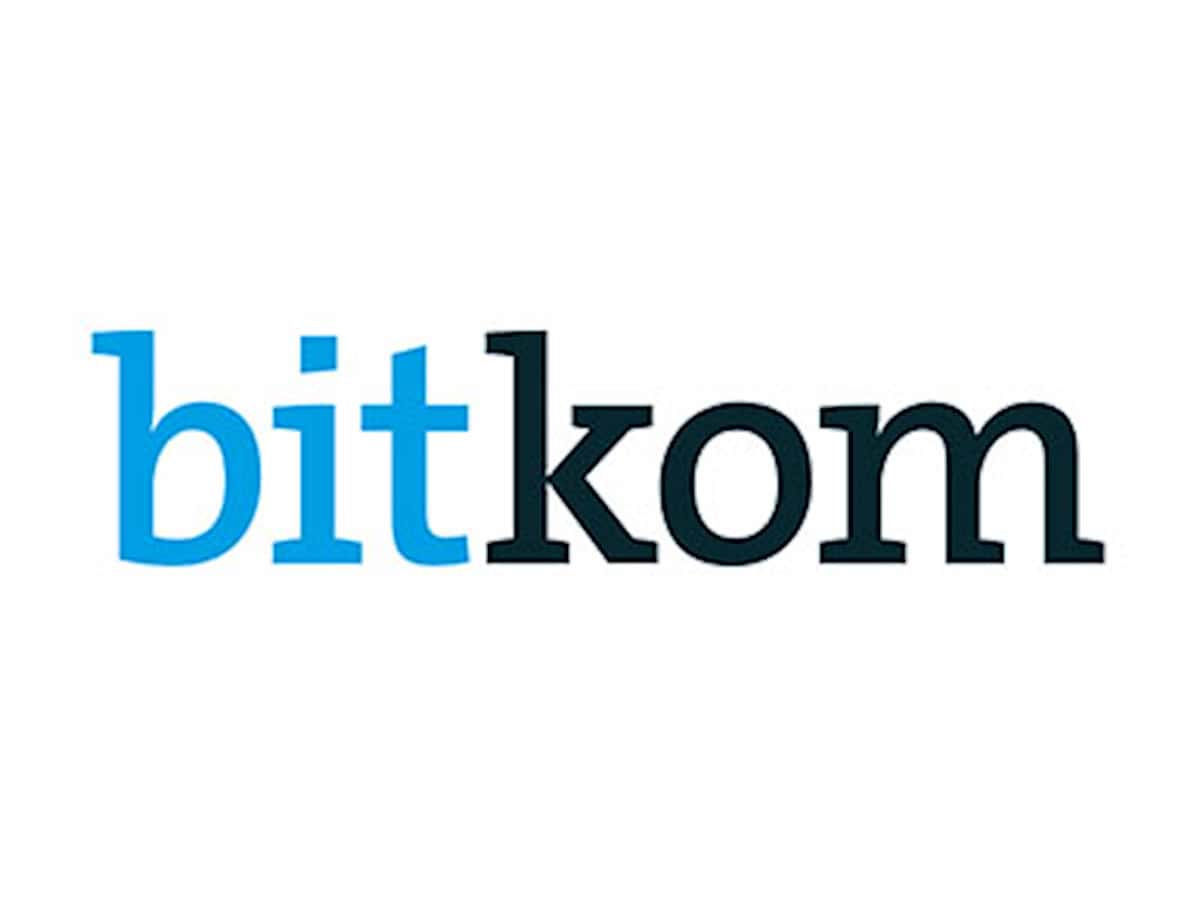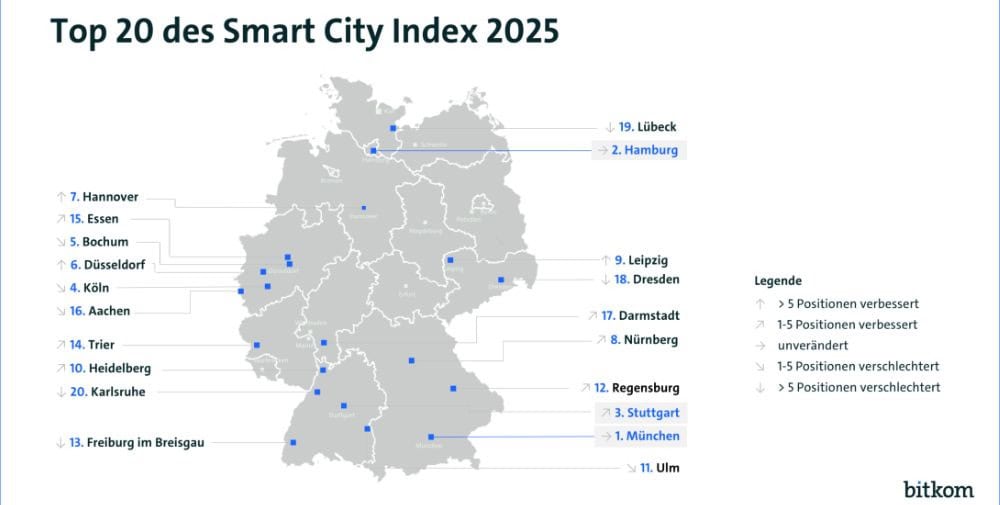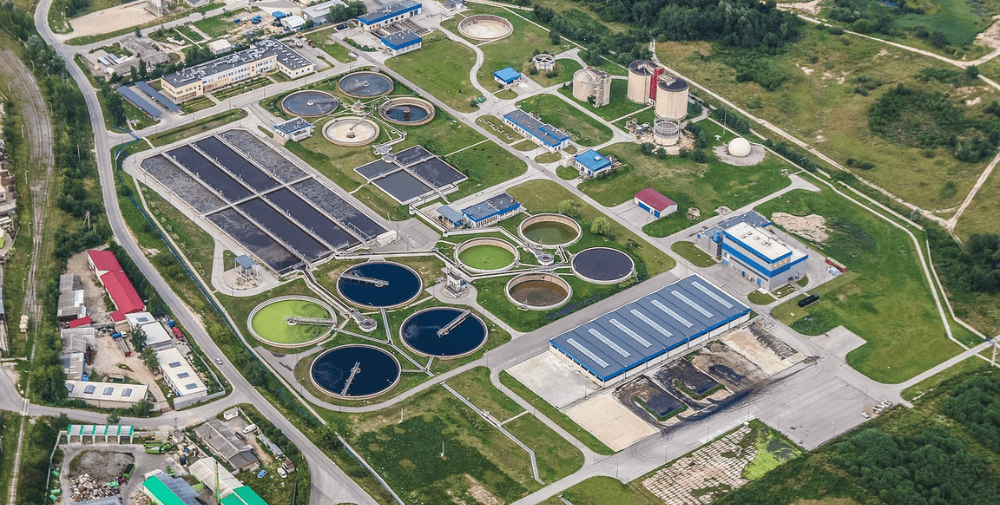
In contrast, Ulm (11th place, previous year: 10th), Freiburg im Breisgau (13th place, previous year: 6th), Dresden (18th place, previous year: 5th) and Lübeck (19th place, previous year: 8th) dropped out of the top ten. These are the results of the Smart City Index, which the digital association Bitkom has calculated for the seventh time this year. Munich achieved 90.2 out of a possible 100 points (up 1.9 points), Hamburg scored 89.6 points (up 5.7 points) and is therefore only 0.6 points behind the top spot. With 88.0 points and a minimal lead, Stuttgart displaces Cologne from third place (87.9 points). Overall, the cities are becoming more digital: while 79.8 points were enough for a top 10 ranking last year and only 76.6 points in 2023, the figure is now 84.7 points. And things are getting tighter at the top, with only 2.2 points between 1st and 3rd place and just 5.5 points between 1st and 10th place.
“Germany’s cities are making great strides in digitalization. This applies to the frontrunners, but above all to the entire range of all 83 major German cities that we examine in the Smart City Index. Smart cities noticeably improve people’s quality of life, be it through efficient and citizen-oriented administration, diverse mobility services or improved environmental and climate protection,” says Bitkom President Dr. Ralf Wintergerst. “Hanover is an encouragement for all cities. The rapid progress within a year shows how digitalization can be advanced: setting ambitious goals, developing measures and – above all – implementing them.”
Up and down: Hanover improves by 34 places, Kaiserslautern slips
In Hanover (overall ranking: 85.8 points), 94 percent of the administrative services surveyed are now available digitally in accordance with the Online Access Act (OZG) – a year ago it was only 50 percent. At the same time, a smart city data platform was introduced within a year, which makes extensive data freely available to business, science and politics. Environmental monitoring has been significantly expanded and a digital participation platform for citizens has been launched, through which more than 20 projects have already been discussed and completed.
Bremen (70.6 points) has also risen sharply, moving up 29 places to 42nd place. Offenbach (68.9 points) climbed 23 places to 49th, while Bremerhaven (65.7 points) climbed 18 places to 58th. “The Smart City Index is a snapshot. The examples show that every city can take huge steps towards digitalization in a short space of time. At the same time, you can see that no one can rest on their laurels,” says Wintergerst.
As a result, there are some cities that have fallen significantly behind. Kaiserslautern (59.1 points) has dropped 24 places and is now ranked 68th, Bergisch Gladbach (55.9 points) has slipped 15 places to 77th, while Salzgitter (42.5 points) remains at the bottom of the ranking in 83rd place, followed by Remscheid (44.2 points) in 82nd place.
Hidden champions of digitalization
Looking at the rankings in the individual categories, overall winner Munich also achieved first place in society and education with 96.2 points, and the Bavarian capital even achieved the full score of 100 points in mobility. Second-placed Hamburg achieved the top position in IT and communication with 95.7 points. However, cities that did not make it onto the winners’ podium in the overall ranking also have strengths. Nuremberg comes 8th in the overall ranking, but is top in administration (97.5 points). Ingolstadt comes 28th overall, but is first in energy and environment (86.6 points). In this category, it is also noticeable that the smaller cities in particular shine: 7 of the 10 best cities in the energy and environment category have fewer than 200,000 inhabitants.
Other cities also perform significantly better in individual categories than in the overall ranking. Krefeld, for example, comes 41st in the overall ranking, but is 8th in the administration category. Gelsenkirchen comes 48th in the overall ranking, but is also in the top 10 in IT and communication with 8th place. And newcomer Cottbus has to settle for 81st place overall, but is 17th in society and education.
“The Smart City Index makes the diverse efforts of committed municipal representatives and citizens visible. The message is: Not only the big metropolitan areas can become smart cities, every city can become smarter,” says Wintergerst. For the first time, Bitkom is presenting online not only the detailed results of the cities but also submitted best-practice examples of smart cities. “We need to do more to promote established digital solutions and make them more widespread,” says Wintergerst. “And we need a change in awareness. Digital services of general interest are not a nice-to-have, but a core task of the state. This also means that the smart city must be financed on a permanent basis and must not be tied to short-term projects.” In addition, Bitkom is calling for the smart city step-by-step plan from June 2024 to be implemented promptly and for innovation-friendly procurement to be made possible so that municipalities can also benefit in particular from the digital offerings of start-ups and small companies, which have often not been able to apply or bid for public contracts to date.
Cities from Baden-Württemberg, Bavaria and Saxony in the lead, Hesse catching up significantly
As in previous years, large cities from Baden-Württemberg perform significantly better than the average. They achieve an average of 78.2 points (2024: 74.1 points). They are followed by Bavaria (75.1 points, 2024: 72.2 points) and Saxony (74.5 points, 2024: 71.8 points). Hesse has improved measurably, from 64.5 to 72.7 points. Rhineland-Palatinate (69.6 points, 2024: 68.1 points), Lower Saxony (68.6 points, 2024: 64.2 points) and North Rhine-Westphalia (68.5 points, 2024: 66.2 points) performed below average. However, the number of cities included in the ranking also differs significantly between the federal states – there are 30 major cities in North Rhine-Westphalia and only 5 in Rhineland-Palatinate. No statement can be made for federal states with fewer than three major cities. Large cities with a population of 500,000 or more and the federally funded Model Smart Cities (MPSC) projects also perform above average. State capitals and university cities are also above average. “Not all cities have the same starting conditions. But the Smart City Index shows: With a clear strategy, clear responsibilities and the courage to change, every city can become more digital and smarter,” says Wintergerst.
More than 13,500 data points for 83 cities
A total of 13,529 data points were collected, reviewed and qualified for the Smart City Index, which is another 245 more than in the previous year. All cities with a population of more than 100,000 were analyzed and evaluated. This year, there are 83, one more than last year, as Cottbus has achieved the status of a major city. The five areas examined were administration, IT and communication, energy and environment, mobility and society and education. The five areas are broken down into 37 indicators, which in turn consist of a total of 163 parameters (1 more than in 2024) – from online citizen services, sharing offers in urban transport and environmental sensors to broadband availability and digital training for teachers and administrative staff. The municipalities were actively involved in the data collection. The cities were able to provide data on digitalization, each with sources. This year, for the first time, all cities made use of this option, resulting in a response rate of 100% (previous year: 99%). The data was then checked and validated by a team of experts from Bitkom Research. The Smart City Index is supported by Visa, PwC Germany and Bentley Systems.
Smart City Index as an interactive online application
The ranking of the 83 major German cities with the results in all sub-areas is available as an interactive online map (https://www.bitkom.org/Smart-City-Index).
– – – – – –
Further links
👉 www.bitkom.org
Graphic: Bitkom




